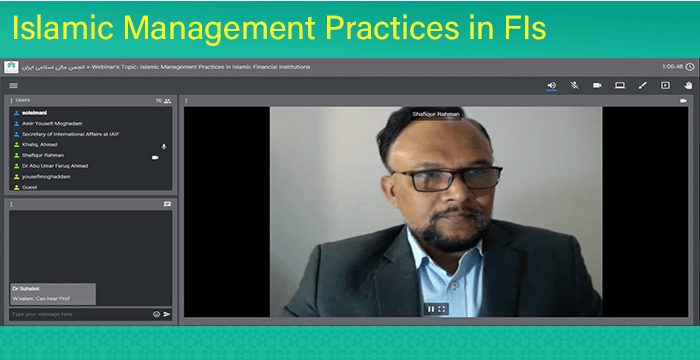

The Iranian Association of Islamic Finance held International Webinar Series on Islamic Management Practices in Financial Institutions.
Dr. Khaliq Ahmad and Dr. Shafiqur Ahmad gave a lecture in international webinar series of IAIF on Islamic Management Practices in Financial Institutions on 8 Feb. 2022
Prof. Dr. Khaliq Ahmad, Research Professor, Putra Business School, Malaysia
Overall, the area of management from Islamic perspectives, principles, theories, is still in its infancy if compared to the more advanced research being conducted in other areas of Islamic Economics and Finance but case studies to capture practices are missing altogether.
Yet, there is sufficient evidence of the potential of this area today when there is need for an alternative perspectives to the presently dominant Anglo-Saxon styles reflected in the American, Japanese and European management practices.
The research study-Islamic Management Practices in Islamic Finance institutions have this findings.
Muslim-managed organizations offer a lot of physical manifestations of religiosity.
The organization culture of the Muslim-managed organization has a distinct Islamic flavor. Organizational culture is also manifested in ways that people dress during working hours.
Leadership style in Muslim-managed organization is predominantly a soft, paternalistic style relying on a combination of the usage of expert and referent power.
The pattern of increasing role of technology is a good sign to remain competitive and it became handy to manage businesses during the Pandemic.
Dr Shafiqur Rahman, Head, Department of Business Administration International Open University
Management involves the five basic functions of planning, organizing, leading, motivation and controlling. Here we explore each of these activities in the light of Islamic management:
Planning: All activities of the Prophet (SAW) in his life were organized with proper planning. Islamic planning follows some principles such as, setting lawful objectives, making plans in a participative and consultative process, setting plans in a composed mind, awareness of the facts of a situation and depending upon Allah.
Organising: Islam identifies the boundary of authority, responsibility, delegation and accountability to attain the objectives of an organization. There are two types of accountability mentioned in Islam. Firstly, an employee is accountable to his immediate superior. Secondly, the employee is responsible to obey the orders of Allah.
Leading: In Islamic management, leadership means solving all problems by a group for seeking Allah‟s pleasure. In this system, leaders must not seek leadership and democratic styles are followed most of the time. Followers have an active role and participation to properly operate leadership and both leader and the subordinates are accountable to Allah and their organisation.
Motivation: Islam emphasizes the significance and role of motivation in human activities. The Prophet (SAW) tried to motivate his followers to follow the teaching of holy Qur’an by motivational tools to solve problems by participation, to motivate by beautiful and attractive saying, clarity of goals and objectives and motivating people for a long-term objective.
Controlling: The foundation of control was stated in Islam in a very simple and concise manner. Surah Al Qasas stated that Allah is merciful and just. He does not destroy or degrade people until they have deliberately rejected His law and continued in practice of inequity.
Findings
1. Rules and Regulations: Islamic rules and regulations are not fully compliant.
2. Knowledge and training: Lack of knowledge and training regarding IM practice.
3. Lack of coordination: Lack of coordination among the IFIs regarding IM practice.
4. Limited research work: Limited scholarly work exist regarding IM practices in Islami banks and insurance companies.
5. Shortage of expert human resources: Very limited HR exist in IM practice.
Conclusion
Practice IM can increase organisational and spiritual peace. If the Islamic insurance companies of Bangladesh adopt the ethics and principles of Islam, this will lead to IM and success will be naturally come as Allah has promised in the Holy Quran.


